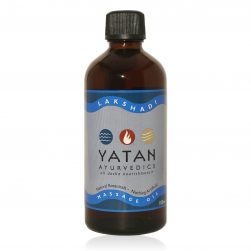What is Psoriasis?
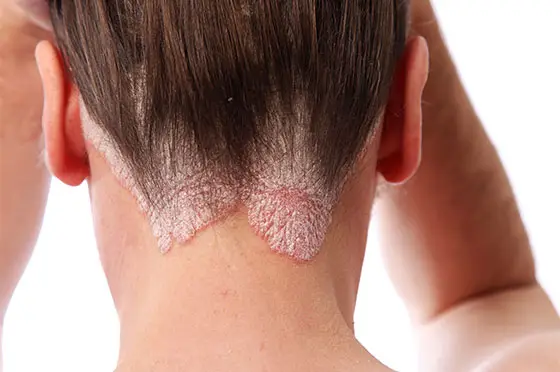
Psoriasis is a condition that affects the skin. Psoriatic skin cells replicate much faster than healthy skin cells. This leads to their accumulation and the formation of scaly, shiny plaques that may easily bleed.
Psoriasis can affect the skin on any part of the body. However, it most commonly affects the elbows, knees, trunk and scalp.
It begins when the immune system becomes overactive.
Psoriasis can be localized, where it affects only the skin. In more severe cases, psoriasis can spread to other parts of the body, such as the joints (Psoriatic arthritis).
What is the Ayurvedic perspective on psoriasis?
The Ayurvedic perspective on psoriasis tells us that psoriasis first begins when the Kapha Dosha becomes aggravated. The symptoms that follow depend on whether another Dosha becomes aggravated as well. This means that the type of psoriasis you have will depend on what Dosha is aggravated.
Read more about how you can identify your Ayurvedic Dosha type – What Dosha Am I?
The Pitta type of psoriasis is the most aggressive type. The skin becomes very red. You may experience extremely itchy skin that bleeds easily.
Many skin layers are characteristic of a Kapha type of psoriasis. The skin may grow so many layers that it starts to look like thick fish scales.
The thick skin may become dry and flakey when a Kapha type psoriasis becomes complicated by a Vata Dosha aggravation. The Kapha-aggravated bulging skin becomes dry and begins to peel. The more aggravated Vata becomes, the drier the skin may become. This may lead to the skin cracking.
In reality, all three Dosha’s are aggravated in every case of psoriasis. The only difference between each individual is to what degree each Dosha is aggravated.
When psoriasis occurs, our immune system attempts to heal it. It does this by producing various biochemical substances. The problem is that the immune system doesn’t always know if the problem is too much or too little of each Dosha. Therefore, the immune system may produce too much biochemical substance, leading to psoriasis aggravation and a more serious autoimmune disease.
What is the cause of psoriasis in Ayurveda?
In Ayurveda we believe that you can either be born with psoriasis or develop it later on in life. Either way, we believe that it is due to karma unfolding in this life.
If you were born with psoriasis, this may be due to karma from your past life. This karma can become incorporated in your life blueprint, or your genetic code, and lead to significant
emotional distress. When this occurs, your nervous system can release toxins into the body. Your immune system does not know how to handle these toxins.
If you developed psoriasis later in life, the karma generated can be due to negative thoughts, emotions or actions.
When you ruminate on negative things, your nervous system begins to produce toxic substances. The more negative thinking you do, the more toxic substance is produced by your nervous system. This leads to an accumulation of toxic substances in your body and an imbalance of your Doshas.
Other times, you may develop psoriasis due to poor lifestyle choices. These include the consumption of acidic food and drink, such as excessive alcohol, acidic drinks and citrus.
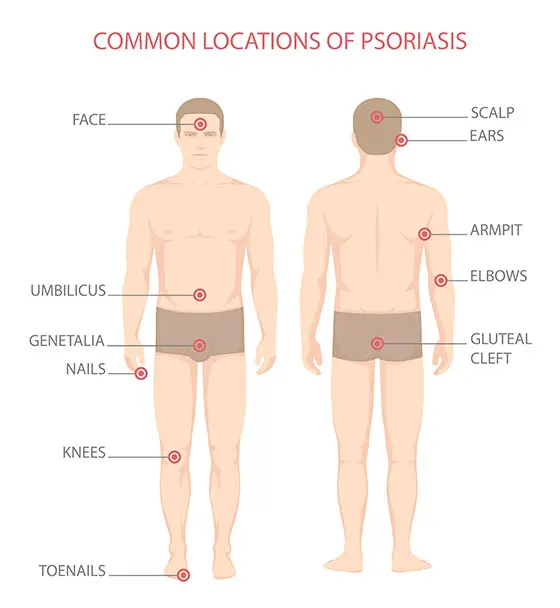
What happens to the excess toxic biochemical substances?
It is the job of the liver cells to neutralize and help eliminate the toxic biochemical substances. However, in psoriasis, the body becomes overwhelmed and cannot process the accumulated toxins. So, the toxins begin to disperse throughout the body and enter various organs.
The waste materials prefer to go to the excretory system to get eliminated from the body. When these channels become blocked the toxins either become spread throughout the entire body, or they can become localized. What actually happens in your body depends on which channels are blocked.
The number and type of channel that is blocked dictates the type of psoriasis that manifests and its severity. We can also characterize the type of psoriasis by which organ it manifests in as well as by which Doshas are aggravated.
What are the common symptoms of psoriasis?
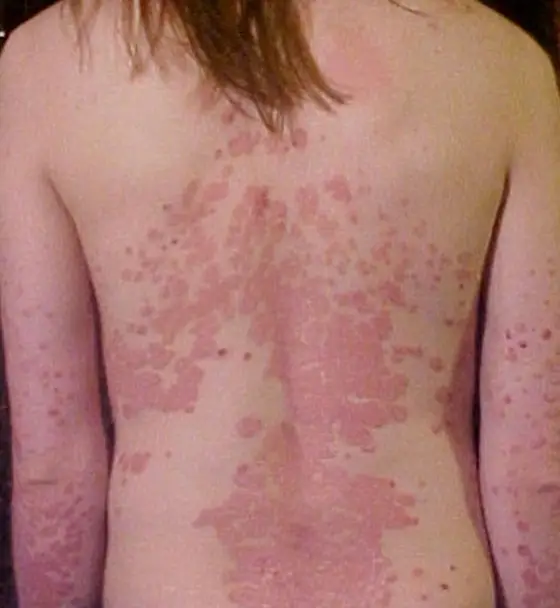
The most common symptoms of psoriasis all involve the skin.
One of the symptoms of psoriasis is itchiness. People may experience itchy and flakey skin. For this reason, psoriasis can get misdiagnosed as eczema, which is another skin condition that involves itchy and flaking skin. This is particularly true if psoriasis symptoms are mild.
Even though itchiness is a very common symptom of psoriasis, some may experience very mild itching, whereas others do not feel itchy at all. This is why it is important to consult a healthcare professional to help you with your problem. To book a consultation with Raman Das, the Ayurveda practitioner at the YATAN Holistic Ayurvedic Centre, please click here
The skin lesions of psoriasis can appear very shiny. When psoriasis becomes more chronic, the skin can appear scaly and begin to peel.
When symptoms of psoriasis become more severe, a person may develop pustules on affected areas. This can be particularly troublesome when the pustules appear on the fingertips or on the feet.
What parts of the body can be affected by psoriasis?
Psoriasis can affect any part of the body, including the head.
Whenever the head is affected by psoriasis, the condition is thought to be more serious. This is true even if no other part of the body is affected. When the head is involved, it may take a longer time to treat.
This is because the head contains the brain as well as control over the entire endocrine system. Therefore, if you impair the head you impair brain circuits, the endocrine system and the immune system to an extent.
Psoriasis is considered milder if the head is not affected.
Interestingly, psoriasis can sometimes involve only the nails on the hands and toes, without affecting any other part of the body.
Is there a connection between psoriasis and stress?
There is a definite connection between psoriasis and stress. You may experience a flare-up of your symptoms during times of stress. Therefore, stress can trigger psoriasis.
Read more – The types of stress and their physical symptoms : which do you have?
However, psoriasis can also trigger stress!
When the skin is very dry, for example as a result of psoriasis, this can irritate your peripheral nervous system.
The peripheral nervous system is the part of the nervous system that is outside of your brain. It sends signals to the brain to let it know what is going on in the body. It also receives signals from the brain that tell the body things like “I’m stressed, time to increase the heartrate”, or “You’re touching a hot stove, move your hand!”.
Sometimes, when skin affected by psoriasis can extend to the mucosal membranes. The mucosal membranes may also become dry and damaged. This further irritates the peripheral nervous system.
In these cases, the irritated peripheral nervous system sends signals to the brain to let it know that something is wrong. This can cause you to feel stressed, and you may not even know why.
Are there different types of psoriasis?
In Ayurveda we recognize that there are different types of psoriasis.
Each type of psoriasis is characterized by a different type of biochemical secretion. Sometimes, this may be a mixture of multiple biochemical secretions.
The types of biochemical secretions depend on what Dosha is out of balance. Therefore, we rely on Dosha symptoms to diagnose the type of psoriasis.
Why does psoriasis occur?
The main reason that psoriasis occurs is due to Dosha aggravation.
The symptoms of psoriasis begin to manifest when waste materials accumulate in the body. The body has a difficult time eliminating these wastes.
What type of person is more likely to develop psoriasis?
A Kapha type person is most likely to develop psoriasis. Although, any type of person can be affected.
The problem in psoriasis begins with a Kapha Dosha aggravation. Psoriasis is more serious when a Kapha type person becomes affected due to a Kapha aggravation.
When Pitta Dosha becomes aggravated, the psoriasis looks very aggressive. However, it is less serious than when it is due to a Kapha aggravation.
As psoriasis becomes more chronic, more Dosha’s become aggravated. This is why psoriasis becomes more complicated to treat as it progresses.
The Vata Dosha becomes aggravated when the psoriasis becomes more chronic. When Vata becomes aggravated, the psoriasis becomes more difficult to treat because it dries out all of the skin oils.

What are the risks if psoriasis is left untreated?
The symptoms of an untreated psoriasis can transform and lead to other types of diseases or infections. For example, an untreated psoriasis can lead to further Kapha aggravation, resulting in psoriatic arthritis.
Kapha and Vata Doshas can become aggravated in various organs. This can lead to a worsening of psoriasis symptoms.
When this occurs, the body tries to heal itself by increasing the function of the immune system and producing more Pitta. Pitta increases the heat in the body and leads to symptoms such as gout, fever and moderate inflammation.
The body becomes more prone to fungal and bacterial infections. This is especially true in the ears and genital organs. These parts of the body provide a good medium for microorganism growth. This is when a Western medical doctor may prescribe antibiotics.
This leads to a cycle of psoriasis medication to calm down the immune system. Antibiotics to treat the infections that occur as a result of a depressed immune system. Then, more medication to calm the immune system. The cycle goes on until you treat the root cause, the Dosha imbalance.
What is the Ayurvedic approach to the treatment of psoriasis?

In Ayurveda, the treatment of psoriasis depends on each person’s condition. That means that the way your psoriasis is treated may be different from the way your friends is treated. In Ayurveda we treat the psoriasis by treating the underlying problem.
Therefore, the type of Ayurvedic medicine that is used for your particular circumstance depends on your underlying needs that led to the psoriasis in the first place. If we attempt to treat the psoriasis symptoms without treating the underlying issues, the treatment might not work.
At YATAN Holistic Ayurvedic Centre we begin by analyzing the nature of your Doshas. We also take into account other problems you may have, such as psoriasis and obesity.
Once we analyze what we have to treat, we come up with a treatment plan that is specific to you. We must work very hard to treat all of the problems you have. This is because the body produces waste (called ama in Ayurveda), and the waste accumulates. If we continue to let it accumulate, it may continue to cause problems even though we are treating one thing. This means that we must treat everything in order to help your body get rid of the toxins and get relief from psoriasis symptoms.
Therefore, in order to treat psoriasis, we must take into account everything that is going on in your body. Frequently, we end up having to balance all three Doshas.
How is long-standing psoriasis treated in Ayurveda?
If you have had psoriasis for a long time, then multiple skin layers might be disrupted. In Ayurveda we must consider how to regenerate all of the damaged materials in your body. Only using psoriasis medication will not help if your vascular system, your mucosa and your skin are all damaged.
We must think about how we can regenerate the mucosal layers, the nerve endings, the vascular beds and anything else that may have been damaged during the disease process. We must treat everything in order to alleviate the psoriasis symptoms.
Ayurvedic medicine for the treatment of psoriasis.
At YATAN Holistic Ayurvedic Centre we make our own psoriasis medicine according to the needs of your body. We establish the needs of your body by analyzing your Doshas.
We make different Ayurvedic medication as you progress through treatment. This is because the needs of your body change as your body changes during treatment.
However, it is important to note that medicine is not enough. We must work on adapting your entire lifestyle to the current needs of your body. Our advice needs to be followed until your body recovers.
Ayurvedic dietary advice for the treatment of psoriasis.
In Ayurveda we recognize that certain foods may cause an allergic reaction in your body. This allergic reaction may lead to psoriasis symptoms.
For this reason, we advise that you remove acidic foods from your diet during the course of your psoriasis treatment. Acidic foods include meat, beef, tomato, citrus. Other possible allergic and/or heating foods includeeggs, strawberries and seafood. Kapha producing foods such as milk and other dairy products ideally should also be avoided during treatment.
Please note that seafood is a very potent trigger of psoriasis.
We may also find that you have other food allergies. You must remove those foods from your diet as well during the course of the treatment.
Any food that you are intolerant to can be a serious trigger for psoriasis. This is because your body does not have the enzymes to process these foods. This means that your body struggles to digest the foods and produces toxins that accumulate and trigger psoriasis symptoms.
In Ayurveda we do not think in terms of proteins, fats and carbohydrates. We don’t even think about the individual nutrients each food possesses. We only think which food is good for your body at this time. We don’t break foods up into its components, we think about it as a whole.
It is important to remember that medicine will not work if you do not respect the diet. This means that without following diet guidelines, the treatment is unlikely to be successful. This is because triggering foods continuously add new toxins into the body. We must stop this process during treatment.
When used together, diet and medication can help your body balance the Doshas. Once the body has healed, the foods that were eliminated can be re-introduced. This is because they do not have the same negative effects on a body that is in balance.
Yoga practice for the Ayurvedic treatment of psoriasis.
In Ayurveda, we use yoga in order to help the body heal from psoriasis.
Yoga helps to increase the circulation of the body. An increased circulation helps the body to speed up the purification process by speeding up the body’s transport system.
Yoga helps to purify and modify the smallest systems of the body: the nerves, capillaries, tissues and cells.
At YATAN Holistic Ayurvedic Centre, we will recommend a yoga practice that will help your body speed up the healing of psoriasis.
Stress management for the Ayurvedic treatment for psoriasis.
Stress plays a major role in the development and propagation of psoriasis symptoms. This is why a major focus of the Ayurvedic treatment for psoriasis is the management of everyday stress.
We seek to make you more resilient and tolerant of the stress in everyday life. We focus on neutralizing the stress hormone profile of your body. We do this by using medication, diet, yoga, meditation and prayer.
We teach you to use Mudra yoga in order to gain mental clarity and emotional balance.
We also encourage you to use prayer, whatever that means for you, to calm your mind and increase your well-being.
How is the Ayurvedic treatment for psoriasis different from the Western medical approach?
The Ayurvedic treatment for psoriasis focuses on the body as a whole system. We consider how your body functions as a whole – including outside factors that may be influencing it such as stress and a suboptimal diet.
The Western medical approach mainly focuses on the signs and symptoms of psoriasis. Therefore, the treatment is to use immune suppressing drugs in order to calm the immune system to reduce symptoms.
The problem is that pharmaceuticals have many side-effects, especially ones as potent as immune suppressing medications. These side-effects lead to other problems that you might have to take more medication to control. For example, there is an increased risk of infection which leads to an increased need for antibiotic therapy.
Ayurveda, on the other hand, focuses on helping the immune system instead of suppressing it. A healthy immune system helps to regenerate damaged cells and organs. The Ayurvedic treatment for psoriasis is a holistic approach. We treat the entire body, mind and spirit so you can feel good about your entire life. Psoriasis is never the problem. It is your body’s way of telling us that there is a deeper problem to look for and fix.
What are the benefits of the Ayurvedic approach and why should you try it?
The Ayurvedic treatment for psoriasis will benefit your whole health, not just your psoriasis symptoms. This is because we take a holistic approach to treatment.
When your psoriasis begins to improve you may be left with some scarring. When this happens, we will change your medication regimen to help remove the scars and balance your skin.
The Ayurvedic treatment for psoriasis, step by step.
Step 1
We analyze your Doshas in order to figure out what is out of balance.
Step 2
We give general lifestyle advice. This includes stress management and diet advice.
Step 3
We give Ayurvedic medication that is specifically made for you and your needs. This medice is made just for you.
Step 4
We recommend a yoga practice that will help to speed up your healing and purify your body.
The treatment regimen is modified as your body begins to change throughout the course of the treatment. We consider the new needs of your body during every stage of your recovery from psoriasis.
How can I prevent psoriasis in the future?
Psoriasis can recur in the future, we cannot ‘prevent’ it. However, after the Ayurvedic treatment for psoriasis, future symptoms may be less intense and require less treatment. The duration of symptoms may also be shorter.
How long does it take to get results from the Ayurvedic treatment for psoriasis?
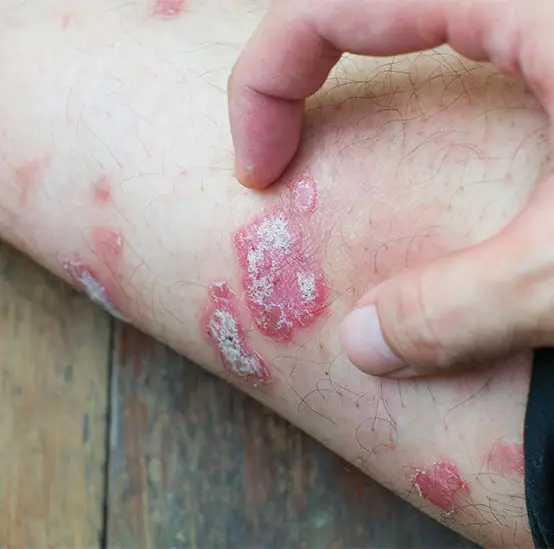
Most people get results in three months from the Ayurvedic treatment for psoriasis. This is especially true if your symptoms were severe.
People with lighter symptoms may see some improvement in their psoriasis within three to six weeks.
The psoriasis symptoms may become more aggressive during the course of the treatment. This is nothing to worry about, it is a normal part of the process. It means that the medication is working and helping your body heal. This will quickly resolve.
The road to recovery is not a straight line. There may be times when your psoriasis symptoms significantly improve, only to come back more severe, then they improve again, and so on. Eventually, they will completely resolve. This is just your body’s healing process.
The whole treatment process can last months or longer, depending on the severity of your initial condition.
If symptoms recur in the future, we just restart the treatment plan again.
How much will the Ayurvedic treatment for psoriasis cost?
The cost of the Ayurvedic treatment for psoriasis depends on each individual case.
Just like the length of treatment varies between cases, so does the cost of treatment.
A case study from one of our patients for Ayurvedic treatment of psoriasis.
My most memorable psoriasis patientwas a homeopathic doctor from Germany with very seriouspsoriasis symptoms.
The symptoms he had were very distressing to him. He had extreme itchiness all over his body, 24 hours a day. He had constant peeling of dandruff flakes from his body. He could not sit without leaving flakes behind on the chair. Finally, his face was very red.
In general, psoriasis is not itchy. However, this man’s entire body was itchy and red all day long. It felt like he had eczema.
He tried every possible medication, but nothing helped. Any cream or ointment he used would maybe help for an hour, then his symptoms would resume.
He was so distressed that he contemplated suicide. He did not feel like a solution existed for his very intense problem.
One night, he went to sleep very distressed and depressed about his predicament. Nothing seemed to work. That night, he had a dream that he should go to Nepal and that he will find a solution for his problem there. His wife was very supportive, so they booked a ticket and flew to Nepal.
They arrived in Nepal and checked into their hotel. From there on, they had no plan. So, next morning they started to walk around the streets of Nepal to find someone that may be able to help him.
On that very same day was the first day that I opened my own clinic in Nepal. He read the sign for my clinic and told his wife that this is where they have to go. His dream was vague about where he had to go when he arrived in Nepal, but he said that this felt like the right place.
After he told me his story, we performed a thorough analysis of his symptoms and Doshas. I told him that I would only be able to treat him if he stayed in Nepal for at least one month. The condition was that he must do whatever I tell him to help him heal. I provided the food; he ate vegetarian food with me. I taught him yoga and stress management. I also provided the Ayurvedic medication for his healing.
I told him that if he felt better in one month, he can take the medication and go back home. Until then, he was to stay nearby.
We began the treatment; he took everything very seriously and was very compliant. Within 10 days, his itchiness improved. He also had less flaking of the skin. He was finally able to sleep at night.
During his last two weeks in Nepal he was able to explore Kathmandu, the capital city of Nepal. I provided him with the medication and told him to instruct the restaurants on what he was able to eat. Every place in Nepal will understand.
His symptoms continued to improve.
To help his recovery, the hotel made a special paste and bath. This included mud and natural ingredients that were placed on the body.
One month later, he felt much better. He left Nepal and went back to Germany. When he required a medication refill, I sent new medication to him by post.
After one full year of treatment, he completely recovered. He never had a problem with psoriasis again.
Related Products: Massage Oils.
Please consider trying our Lakshadi Ayurvedic Body Massage Oil.
This is a Pitta balancing oil.
The Lakshadi Ayurvedic Body Massage Oil may help to relieve psoriasis symptoms in mild disease. It may help to regulate the dryness, itching and redness.
You may try these oils on your own if you have mild symptoms. However, it is always best to seek the advice of an Ayurveda practitioner the best results.
For more psoriasis information please visit our other blog posts:
Schedule Your Free 10-Minute Consultation
*Discover holistic healing with a complimentary phone or video consultation from our expert Ayurvedic practitioner. Start your path to better health today!*



















